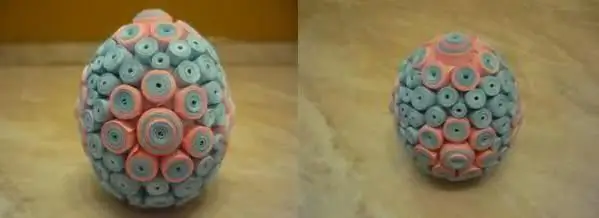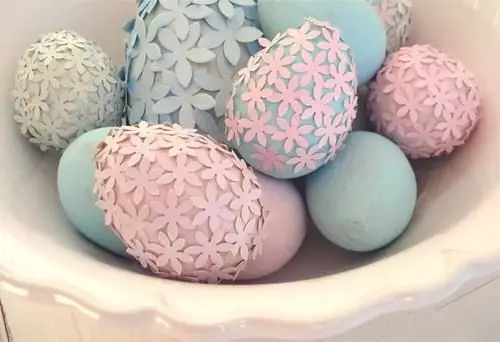
Table of contents:
- Author Sierra Becker becker@designhomebox.com.
- Public 2024-02-26 03:46.
- Last modified 2025-01-22 22:09.
The "quilling" technique allows you to make amazingly beautiful eggs for Easter. In addition to them, you will need colored paper, glue and a wooden toothpick. These are all the items that are needed to implement interesting ideas using quilling. The Easter egg will turn into a real work of art and will be the subject of your pride.
How to make an egg harvester
This beautiful craft is easy to make with your own hands. You can buy egg blanks or make your own. If you want to use the second option, then you will need newspapers. They need to be crushed and lowered for a few minutes in water. Easter quilling begins with this.
When they are soaked, wring out excess moisture and shape them into an egg. Put it in a bowl and put it in a warm place until completely dry. After that, you will have to prime the surface of the workpiece with white acrylic paint, then cover with PVA glue and let dry.
Now starts by itselfquilling. The Easter egg will soon turn out as beautiful as in the photo. To do this, you need to prepare the necessary.
Sample 1 - For beginners

If you want to decorate the workpiece with pink and blue elements, take double-sided paper of these colors. In addition to it, you will need a thin iron ruler and stationery glue. It is inconvenient to cut thin strips with scissors, so we won't need them here.
Place the ruler on the straight edge of the blue paper. Step back from it 2-3 mm, cut a thin tape with a clerical knife. Move the ruler and cut the next strip of the same width. You will need approximately 150 strips. If you don't feel like cutting that much, do less. Then you decorate not everything, but part of the egg, laying out a drawing on its surface. If you want to have not only small, but also large flowers, then cut out strips of pink paper. Glue some ribbons of this color to the blue stripes.
Continue not difficult but painstaking work
Wind paper ribbons around a toothpick, then slightly loosen the resulting spiral, glue its free end to the base. Make all paper parts in this way.

Now you can start decorating the workpiece using the "quilling" technique. The Easter egg will turn out the same as in the photo if you stick the elements you just made on the newspaper blank, looking at the hint. To do this, on a sharp and blunt endeggs, glue large pink-blue spirals in the form of flowers on its sides. Fill the space between it with blue blanks. Let the craft dry, after which it can decorate the Easter table.
Second idea - start with an egg

If you want to reproduce more intricate patterns, then you need pink, green, red, yellow paper. You will make such a craft even faster than the first one, since there are not many elements to do here. In addition, there is no need to make a workpiece, take a chicken egg, but first boil it hard-boiled. To prevent the shell from bursting, remove the egg from the refrigerator before boiling and let it warm up to room temperature. Then s alt the water well, then the shell will not burst.
While the boiled egg is cooling in cold water, we will make decoration elements using the quilling technique. The description of this process begins right now.
Decorating a boiled egg
You can buy strips that are designed for this type of needlework, or you can make them yourself. If you prefer to do it yourself from start to finish, then put a sheet of 2-sided pink paper in front of you and, as described above, cut several strips that are 3 mm wide.
From them, winding on a toothpick, make a few spirals. Don't forget to tape the free end to keep the pieces intact. Now each spiral needs to be given a slightly different shape. It can be a "drop", "bird's foot","curved drop". More details will be discussed in the next section on how to make these and other basic elements of the quilling technique. You can decorate an Easter egg with any of them.

In the meantime, slightly loosen the twisted spiral, squeeze it on one side so that the inner curls turn around a little. You have a "drop". Glue this element to the egg and several similar ones next to it.
To make a flower stem, cut a strip of green color 3 mm thick, 15 cm long. Wind it around a toothpick or needle in a spiral, placing the next curl under the previous one. From the same paper, cut out semicircular leaves, glue these parts of the flower in place.
This is how you can decorate Easter eggs with your own hands.
Quilling - basic elements
They will help you find more and more ideas for the design of Easter paraphernalia. How to make a "spiral" and a "drop" was described above, now how to make an element called a "bird's foot", or, as it is also called, a "cross". It is also made from a "spiral". Slightly loosen it, give it the shape of a triangle. Do not clearly mark one of the corners. Pull the opposite side to it, press it with your finger so that the straight line becomes concave.

If you are making a quilling Easter egg using the pattern above, this and the following elements will come in handy.
"Arrow" will come from a weakened spiral, from which you will also first formtriangle, and then pull two of its corners to each other and press them with your fingers to fix them.
The heart will look very touching. You can present an Easter egg decorated with it to your loved one. Divide the thin strip of paper in half. Twist from opposite ends in a spiral. Leave a small distance between these shapes so that the fold becomes the center of the heart. Attach the two spirals at the top with glue.
The “S” element is made in almost the same way, only the upper spiral is slightly smaller than the lower one. When they are almost connected when twisting, turn the top to the right and the bottom to the left.
How to make leaves
The Easter egg looks beautiful using the "quilling" technique, where elements designed in the form of a flower are adjacent to those that look like leaves. To make the last one, slightly stretch the spiral in opposite directions, squeeze each of the two resulting corners. Mark one of them more clearly - this is the top of the sheet. Let the second one be semicircular, bend it slightly to the left.
Armed with such useful knowledge, you can easily make other voluminous Easter eggs.
Quilling, master class
Cut green strips, twist them into tight spirals, glue them, laying them out in the form of ovals, from one and the other side of the egg. If you want these blanks, as in the photo, to have a dark green core, glue each bead on these places.

Twist orange paper ribbonselements of the "S", glue them inside and outside the green ovals.
Now you need to make roses. To do this, wind the orange strip around the toothpick. Make 2 turns - this is the core of the flower. Now twist the paper tape. Make each turn two such folds - on opposite sides of the flower.
Before you glue the roses, make large "leaves" from long strips of green. Glue them first, then the roses, after which your Easter eggs will be ready. Quilling (the master class of this technique given in the article helped you master an interesting type of needlework) allows you to create a real miracle from simple materials!
Recommended:
Pasta Easter egg: master class

Having prepared the necessary set of materials, you must figure out what the craft will look like. An Easter egg made of pasta should be the embodiment of your own imagination, you can involve all household members in its manufacture so that everyone puts a particle of their soul into the decor element
Papier-mache egg - an original and exclusive gift for Easter

Today, handmade creativity is again on the crest of popularity. All new ideas for decorating rooms with the help of papier-mâché are brought to life, and in combination with other techniques, real works of art are created. Papier-mache egg - an object for inexhaustible inspiration
How to do quilling. Quilling - master class. Quilling - schemes

How to do quilling? The article describes several dozen basic elements of quilling, from which compositions are then built. Master classes were given on the preparation of postcards, wood, topiary, bulk flowers
Quilling: snowflakes for beginners. Snowflakes in quilling technique: schemes

There is more than one master class from which you can learn how easy it is to create a quilling snowflake. For beginners, it will not be difficult at all if you break the whole process down
DIY Easter decoration (photo). Dough decorations for Easter

Easter is a beautiful holiday that we all love to celebrate. How to make the decor of your home unique, so that your guests enjoy spending time here with you?
